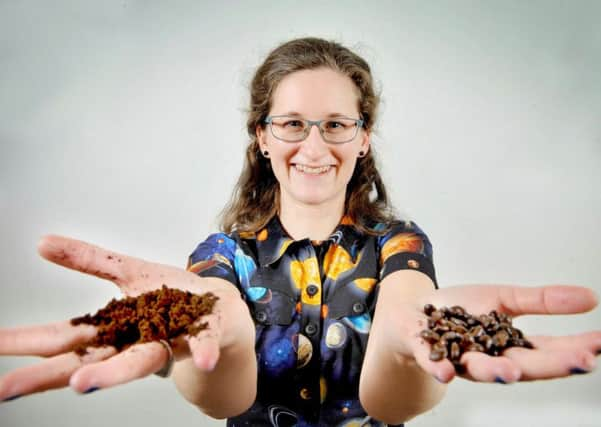Scots firms seek award for recycling of coffee


Now the mass consumption of coffee is being targeted by two innovative Scottish firms working to cut waste and improve sustainability in Scotland and beyond.
Carbogenics and Aurora Sustainability will represent Scotland in a European-wide competition to find the next generation of clean-tech companies that are both profitable and safe to the environment.
Advertisement
Hide AdAdvertisement
Hide AdCoffee has proved to be the perfect resource for both firms, given the huge volume of waste products created by the world’s most popular beverage.
With only an estimated 1 per cent of coffee cups recycled in the UK, Carbogenics uses a high-temperature technique to turn the paper and plastic mix into a charcoal-type material. Rich in natural fertilisers, the CreChar black powder is then used to make plant pots for the domestic garden.
The idea is worth an estimated €3 billion to the European market.
Aurora Sustainability, meanwhile, collects used coffee grains from cafés to create a nutrient-rich growing material for mushroom crops. Waste heat produced by the whisky distilling industry in Scotland is also captured to help build the right growing conditions.
Both companies will represent Scotland at the final of ClimateLaunchpad in Estonia in October along with Glasgow-based HakySack, an online rental service for personal possessions, which also won the Scottish heat of the contest.
There they will meet investors, scientists and environmentalists searching the next big clean-tech idea with a €105,000 prize fund now open.
Franziska Srocke, the co- director of Carbogenics and a student at Edinburgh University’s School of Geosciences, said: “It is so difficult to recycle the paper fibre used in coffee cups and we really need to do something about the waste. We set about to find this alternative way to treat the cups.
“While coffee cup lids are generally recyclable, the cup is frequently coated in polyethylene film to help make it waterproof and resistant to high temperatures.
Advertisement
Hide AdAdvertisement
Hide AdSrocke, whose firm came first in the Scottish ClimateLaunchpad heat, said: “We are hoping to have a partnership with coffee chains in the future. These companies are looking at solutions as they want to do something about the waste and improve their green image.”
“We are really excited to be going to Estonia. We only registered our company in April so this is a great opportunity to go to Estonia and meet investors and hear other big ideas.”
Iain Findlay, co-founder of Aurora Sustainability, which is based in Moray, said coffee grounds were a rich source of minerals, given that around 99.8 per cent of nutrients in coffee did not make it into the coffee cup.
“People don’t drink coffee for the nutrients, so what you find is that the grounds are full of them, such as nitrogen. They have already been sterilised given that boiling water has been through them, so they are perfect for growing mushrooms, ideal in fact.”
Findlay has since signed an agreement with a whisky distiller in the north of Scotland to trial a heat capture exercise at one of its plants.
He said: “The idea is to generate food from waste of all kinds.”
Currently, he collects ten kilos of coffee grounds a day from just one small coffee shop in the Moray area and said there was an “enormous” opportunity to work with coffee chains on a larger scale.
Once the mushroom crops have been harvested, he will then sell on the tiny roots – called Mycelium – for animal feed.
Advertisement
Hide AdAdvertisement
Hide Ad“It’s really about trying to rebuild natural capital and helping the ability of the soil to keep feeding itself – and people.”
Andrew Mitchell, national lead for ClimateLaunchpad in Scotland, said the calibre of the three finalists showed that Scotland had the ability to “address the world’s climate crisis through diverse and globally ambitious entrepreneurs”.